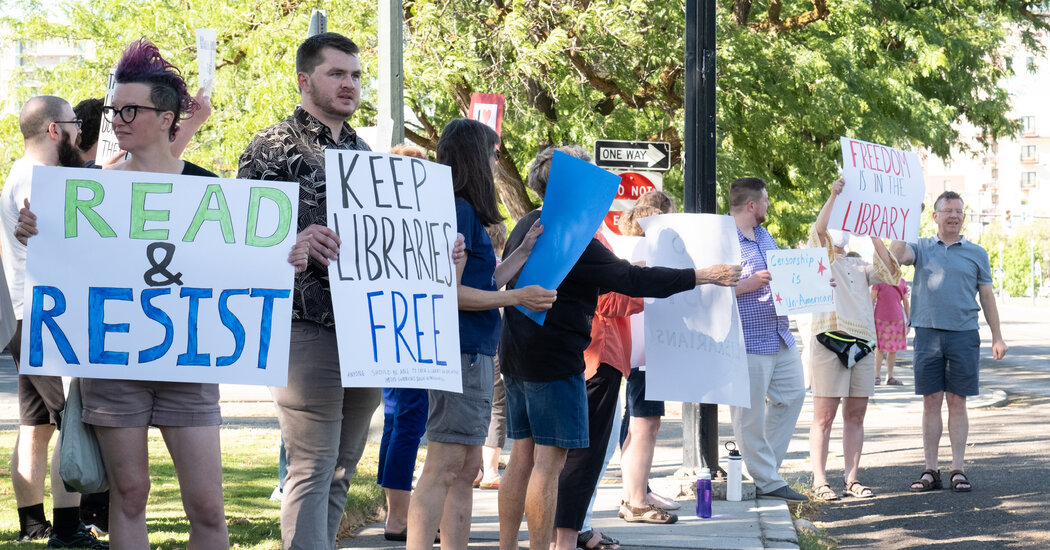While the effort to restrict access to books has been getting somewhat less attention on the national stage, it remains a potent issue on the state and local level, where most decisions about schools and libraries are made.
Over the past few weeks, new laws or regulations have gone into effect in Utah, Idaho, South Carolina and Tennessee that will make it more difficult for young people to access books and library materials that could be considered obscene or harmful.
Proponents say these rules are necessary to protect children from encountering sensitive topics, like sexual content, sexual violence or graphic depictions of nudity, on their own. Detractors say these rules make it difficult for students to view a range of books, including those that reflect real world experiences and some classics with more mature themes that have long been taught in high schools.
Here’s what to know about the new state rules:
Utah
An amendment to an existing law that went into effect on July 1 aims to “identify and remove pornographic or indecent material” from school classrooms and libraries. This includes any book or other classroom or library material that includes descriptions of sex or masturbation.
Traditionally, schools have been allowed to take into consideration whether a book has artistic merit or would be otherwise valuable to students. “Beloved,” by Toni Morrison, for example, has been challenged repeatedly around the country, but is widely considered to a be masterpiece. The new law explicitly addresses this question, saying that local education agencies, which includes school boards and the governing boards of charter schools, should prioritize “protecting children from the harmful effects of illicit pornography over other considerations.”
Under the law, each local education agency must tell the state whenever it removes material from circulation. If the same material is removed by three school districts — or two school districts and five charter schools — the Utah State Board of Education will order it to be removed statewide.
Idaho
Since the law went into effect on July 1, libraries have been required to hold “obscene materials,” as defined by an existing statute from the 1970s, in a separate adults-only area. The definition includes nudity and sexual conduct including “masturbation, homosexuality, sexual intercourse,” as well as “sadomasochistic abuse.”
The bill’s sponsor, Idaho State Representative Jaron Crane, emphasized in an interview that this was not a book banning bill, but a relocation bill intended to keep minors from stumbling upon these materials. The materials can be kept in a separate section, such as behind the checkout counter. The books remain available and parents are free to check them out for their children, he said.
But some libraries have concerns about how the rule will be implemented. The Donnelly Public Library in Donnelly, Idaho, for example, is only 1,024 square feet and does not have enough space to adequately separate their adult materials, according to its website. The library will now require permission from a parent or guardian for a child to enter the library alone.
Saba Baig, the vice chair of the library board in Latah County, said she was concerned about how much it would cost to implement the legislation. If a library does not relocate a book within 30 days of receiving a complaint, the person who complained may be entitled to $250 in damages, but more broadly, she said it wasn’t clear if libraries would need to pay a lawyer to review complaints from people objecting to books. And if a complaint winds up in litigation, she said, it could be ruinously expensive for libraries that operate on a small budget.
South Carolina
The state education department has said South Carolina’s new regulations are an effort to create a uniform process to replace a patchwork approach to challenging books and deciding whether they are appropriate. Under the new rules, which went into effect last month, districts will be required to keep a list of all books and materials available to students, and there will be one statewide form for lodging complaints about books.
According to the rule, the materials cannot include any depiction of sexual conduct, regardless of the grade level they are intended for. Districts can decide whether to comb through their collections and remove anything that would contravene the rule, or they can apply the standard to new purchases going forward and address any challenges as they arise.
Joshua Malkin, a senior advocacy strategist at the ACLU of South Carolina, said he worries that these rules could peel away classics like “The Bluest Eye,” “1984” and “The Catcher in the Rye.” He also criticized the regulations for making no distinction between what’s appropriate for an elementary student versus a high school student.
Tennessee
An amendment to an existing law that went into effect July 1 codifies the definition of what books and library materials are suitable for children in kindergarten through 12th grade. It says material that includes any descriptions or depictions of sexual conduct, “sexual excitement,” excess violence or sadomasochistic abuse cannot be part of a school library’s collection.
When a book is challenged, the local education agency has 60 days to decide whether it is appropriate for children. If the agency does not make a decision in that time frame, those concerns can be brought to a state commission. If that commission decides the book should be removed, then it must be removed statewide.
Kasey Meehan, the program director of Freedom to Read at the free speech organization PEN America, called the definition of suitability broad and vague, and said the measure was reminiscent of rules in other parts of the country that led to more books being pulled off the shelves.
